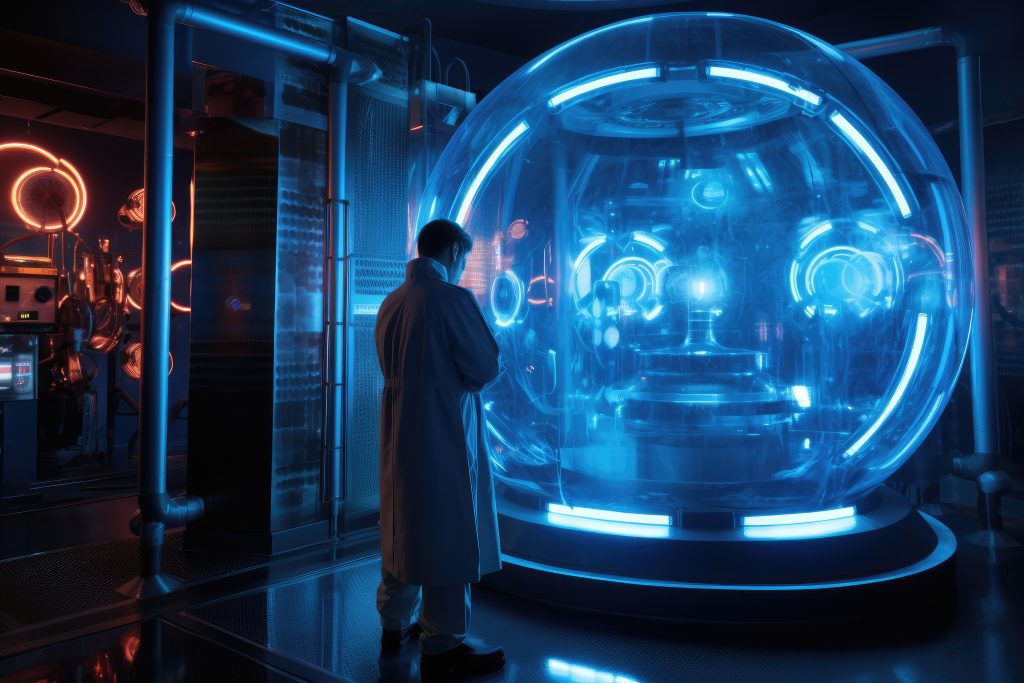The Next Industrial Wave

Quantum, Space, and the Internet of Everything
Introduction: The Dawn of a New Technological Epoch
Humanity has always moved in waves of transformation.
The first industrial revolution gave us steam and mechanization. The second brought electricity and assembly lines. The third digitalization turned information into power.
But now, the world stands at the threshold of a fourth and fifth wave, converging into one unprecedented force the Quantum-Connected Age.
In this new era, computation defies logic, communication transcends the planet, and every device, machine, and process becomes a living node in an intelligent ecosystem. It’s a world where quantum computing, space technology, and the Internet of Everything (IoE) fuse to redefine not just industries, but civilization itself.
At TechSurgeAI, we call this evolution the next industrial wave, a movement that will set the foundation for the next 100 years of progress.
1. From Steam to Superposition: The Journey of Human Innovation
The first industrial revolution mechanized production, allowing humans to multiply effort through machines.
The second automated factories and brought electricity to every corner of society.
The third introduced computing, turning logic into language and data into a new kind of fuel.
Now, we are entering a realm that doesn’t just make machines faster, it makes them smarter, predictive, and interconnected.
Each revolution shortened the distance between idea and impact. What once took centuries now happens in years. The next industrial wave promises instant evolution progress that updates as quickly as a software patch.
But this isn’t merely about new tools. It’s about new principles of reality: the quantum rules that govern the microscopic world, the vastness of space as an infrastructure, and the seamless fabric connecting every entity on Earth.
2. Quantum Computing, Beyond Binary Boundaries
Traditional computers speak the language of binary zeros and ones.
Quantum computers, however, operate in superposition, where data can exist in multiple states simultaneously. This allows for exponentially greater processing power not millions, but potentially trillions of calculations at once.
Imagine solving global climate models in seconds, designing pharmaceuticals atom by atom, or securing communication with unbreakable encryption. That’s the promise of quantum computing.
Tech giants, research institutes, and governments are racing toward “quantum advantage”, the moment when quantum computers outperform classical ones in practical tasks. Companies like IBM, Google, and IonQ are already demonstrating breakthroughs, while nations are investing billions to secure leadership in this domain.
But quantum isn’t just faster computing. It’s a new kind of intelligence, one that mimics nature’s complexity rather than simplifying it.
At TechSurgeAI, the interest lies not only in raw power but in the integration, how quantum computation will enhance cloud systems, predictive analytics, and sustainable innovation across industries.
3. Quantum Communication and Security: A New Trust Paradigm
The digital world depends on encryption mathematical keys that secure everything from banking to defense.
Quantum computing, ironically, threatens that security by being powerful enough to break traditional encryption algorithms. But it also offers the solution: quantum cryptography.
Through quantum key distribution (QKD), data can be shared with absolute certainty if an outsider tries to intercept it, the quantum state changes, instantly revealing tampering. This principle of quantum trust may soon form the backbone of global communication.
Quantum internet prototypes are already live in China, the EU, and the U.S., connecting labs through entangled photons over hundreds of kilometers. In time, this network will evolve into a global quantum web connecting data centers, satellites, and cities through physics itself.
When trust becomes unhackable, collaboration becomes limitless.4. The Space Technology Renaissance
While quantum redefines the invisible world, space technology is transforming the physical one.
We are witnessing the rebirth of a space age one not led by governments alone, but powered by private enterprise.
Reusable rockets have slashed launch costs by over 90%. Satellite constellations are blanketing the planet with broadband connectivity. Space stations, lunar missions, and asteroid mining ventures are transitioning from science fiction to business strategy.
Why does this matter to everyday industries? Because space is becoming the new infrastructure. It enables global data coverage, climate observation, GPS precision, and disaster forecasting. In a connected economy, the view from orbit is as critical as fiber optic cables on Earth.
At TechSurgeAI, we see space not as a frontier, but as a platform the layer that supports the planet’s data, communication, and energy ecosystems. The companies that master this infrastructure won’t just reach the stars they’ll power life below them.
5. Data from the Stars: Satellites and the Connected Earth
There are over 9,000 active satellites orbiting Earth today, many part of constellations delivering real-time global connectivity.
These satellites do far more than stream internet; they monitor weather, guide ships, map forests, and track climate change minute by minute.
This data from orbit to industry fuels the Internet of Everything.
Farms use satellite analytics to optimize irrigation. Logistics firms use orbital insights to streamline routes. Governments use real-time imaging for urban planning and defense.
The fusion of terrestrial sensors and extraterrestrial data is creating the first truly planetary nervous system, a web of awareness spanning sky to soil.
6. The Internet of Everything, When All Things Think Together
The Internet of Things (IoT) connected devices.
The Internet of Everything connects systems, people, data, and processes into one dynamic network.
Think of a world where your car communicates with city infrastructure to avoid traffic, your home adjusts its energy consumption based on real-time grid data, and global supply chains predict disruptions before they happen. That’s IoE — where intelligence isn’t centralized in a cloud but distributed across the environment.
By 2030, experts predict over 125 billion active IoE connections, each generating insights that continuously refine how the world functions.
For industries, this means moving from reactive operations to predictive ecosystems, where decisions are made by networks that learn and adapt autonomously.
The next industrial revolution won’t be powered by oil or data alone, it will be powered by connection.
7. Smart Infrastructure and the Rise of Cognitive Cities
Imagine cities that repair themselves, energy grids that learn from weather, and transport networks that coordinate across air, land, and orbit.
This isn’t fantasy — it’s the logical outcome of merging IoE with quantum computation and space-enabled data.
Cognitive cities will process information as fast as they generate it. AI-driven traffic systems will talk to satellites, public services will sync with wearable data, and sustainable design will become automated.
Dubai, Singapore, and Tokyo are early examples — living laboratories where digital infrastructure becomes as important as physical roads. But the next wave will push this further, blending space-based data, real-time analytics, and community-driven governance.
At TechSurgeAI, this convergence defines the infrastructure of tomorrow adaptive, decentralized, and profoundly human-centric.
8. Challenges: Security, Sovereignty & Ethics
With great connectivity comes great complexity.
Quantum computing may secure networks, but it could also empower cyber warfare.
Space technology may unify communication, but it raises questions of ownership and militarization.
The Internet of Everything may optimize life, but it threatens privacy at a scale never seen before.
The next industrial wave isn’t just technological, it’s ethical and geopolitical.
Who owns the quantum cloud? Who governs orbital data? Who ensures the Internet of Everything doesn’t become the Surveillance of Everything?
The answers will shape the digital constitution of our future civilization.
That’s why digital responsibility transparency, regulation, and moral foresight must grow alongside innovation. The new industrial leaders won’t just master science; they’ll master stewardship.
9. The Human Element in a Machine-Driven Future
Despite its complexity, this revolution is still about people.
Machines may compute; humans create meaning.
Quantum algorithms will need human curiosity to define purpose.
Satellites will need human empathy to decide how they serve.
The Internet of Everything will need human judgment to balance progress and privacy.
In the quantum age, soft skills will become hard currency.
Ethical reasoning, leadership, creativity, and critical thinking will define those who thrive.
At TechSurgeAI, we see the next century not as an age of replacement, but of reinforcement — where human ingenuity scales through digital tools to solve the biggest challenges in history.
10. Building the Next 100 Years
If the 20th century belonged to electricity, the 21st belongs to entanglement and expansion — quantum logic and cosmic infrastructure fusing into a single evolutionary leap.
The next industrial wave will:
-
Rebuild industries on physics-level computation.
-
Connect the planet through orbiting digital ecosystems.
-
Empower societies with predictive, sustainable intelligence.
And yet, its success depends on one timeless truth:
Progress without purpose is chaos.
The technology of the next 100 years must reflect the values we hold today transparency, equality, sustainability, and curiosity. Because while the tools evolve, our moral compass must remain constant.
Conclusion: The Infinite Horizon
The steam engine shrank distance. The microchip shrank time.
Now, the next industrial wave will shrink uncertainty giving us clarity in an unpredictable world.
Quantum computing will teach us new laws of thought.
Space technology will make our planet self-aware.
The Internet of Everything will weave every human and machine into one intelligent continuum.
And at the center of it all stands us.
The dreamers. The builders. The thinkers who dare to merge imagination with engineering.
At TechSurgeAI, we believe the next revolution won’t just change technology.
It will redefine civilization itself.
The next 100 years begin now
not with the press of a button, but with the spark of vision.
